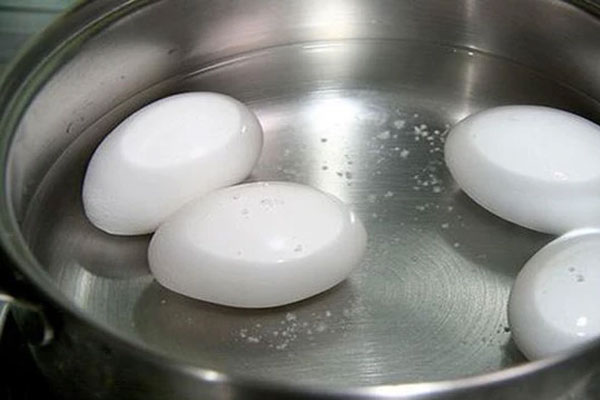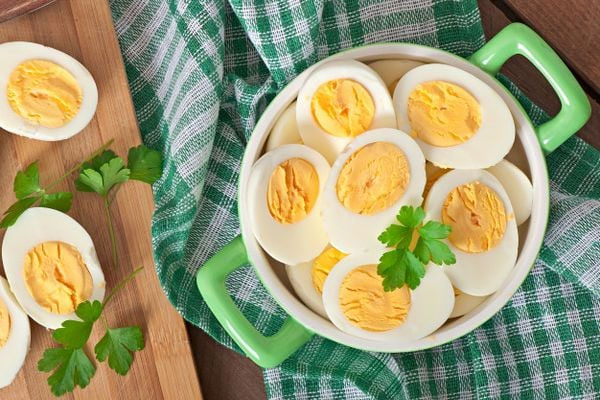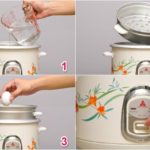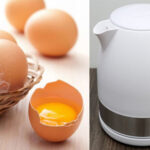Many people encounter the issue of cracked eggshells when boiling eggs, which can be unsightly and affect the taste. Here are some tips to ensure perfectly boiled eggs that are both aesthetically pleasing and nutritious:
Don’t boil too many eggs at once
When boiling eggs, place them in a pot of gently boiling water. To prevent cracking, avoid overcrowding the pot, which can cause the eggs to bump and crack during the boiling process.
 Add a teaspoon of vinegar to each egg before boiling.
Add a teaspoon of vinegar to each egg before boiling.
Add vinegar and a pinch of salt to the water
Before boiling, add a teaspoon of vinegar to each egg. Vinegar helps the egg white coagulate faster and hardens the shell, preventing cracks. Adding salt to the water will make peeling the eggs easier and may also help prevent cracking.
Bring the water to a boil before adding the eggs
To avoid cracked eggs with exposed yolks, bring the water to a gentle boil first, then add the eggs. This ensures even exposure to high temperatures, reducing the risk of cracks that can cause the egg white to leak out.
Boil the eggs over medium heat
When boiling eggs, use medium heat to maintain a gentle boil and prevent the eggs from banging around in the pot. High heat can cause the eggs to crack due to vigorous movement. This technique helps maintain the eggs’ attractive appearance and prevents the white from seeping out.
Use a pot that’s the right size
Choose a pot that is appropriate for the number of eggs you are boiling. A pot that is too large or too small can cause the eggs to bang against each other or the sides of the pot, leading to cracks. The right-sized pot ensures even cooking.
 Boiled eggs that are both beautiful and nutritious.
Boiled eggs that are both beautiful and nutritious.
Plunge the eggs into cold water immediately after boiling
As soon as the eggs are cooked, remove them from the pot and place them in a bowl of cold water. This stops the cooking process, making the eggs easier to peel, and also prevents further cracking due to sudden temperature changes. This helps maintain the eggs’ freshness and attractive appearance.
Notes:
Don’t overboil the eggs
While it may seem like a good idea to boil eggs for a long time to kill any bacteria on the shell, this can actually reduce the nutritional value of the eggs. Prolonged boiling can cause a reaction between the iron and sulfur in the eggs, leading to a decrease in essential nutrients. Overboiled eggs are also more prone to cracking, affecting their quality and taste.
Avoid underboiled eggs
Some people prefer runny yolks, but it’s important to fully cook eggs to prevent bacterial contamination, which can cause digestive issues and food poisoning. Properly cooked eggs are safer and healthier.
Additionally, if you’re storing eggs in the refrigerator, take them out 15 minutes before boiling, and only add enough water to cover the eggs by 2-3 cm. Always leave the lid off when boiling.
Source: GĐ&xh
The Ultimate Guide to Quickly and Conveniently Microwaving Eggs, with a Professional Chef’s Essential Safety Tip
 Eggs, with a Professional Chef’s Essential Safety Tip’>
Eggs, with a Professional Chef’s Essential Safety Tip’>This method is still applied by chef Caroline Lange (living in New York, USA) every time she boils eggs in the microwave and achieves perfect results. The eggs don’t explode but still taste delicious, and it even saves time.
The Perfectly Boiled Egg: No More Runny Whites!
“A common dilemma when boiling cracked eggs is the unsightly leakage of egg whites. This can be a messy and frustrating experience, leaving you with an unappetizing egg and a pot of cloudy water. But fear not, there is a simple solution to prevent this from happening and ensure your boiled eggs are perfect every time.”






































